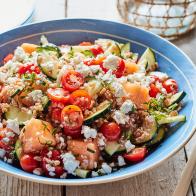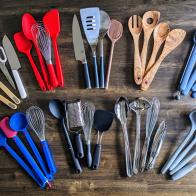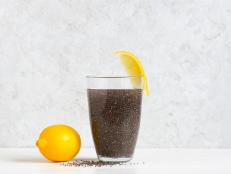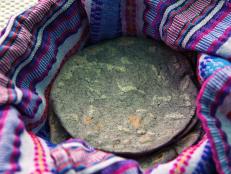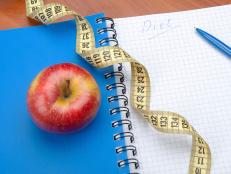7 Foods That Can Boost Your Brain
Plus, how to get more of them on a budget.

whitewish/Getty Images
Some foods are better than others at boosting memory and cognition. While it probably isn’t surprising that a not-so-healthy diet isn’t good for brain health, there’s new research exploring which foods can help protect the brain from dementia.
Think you’re too young to worry about dementia? Think again.
“Brain healthy habits are best started early,” says Jessica Caldwell, PhD, director of the Women’s Alzheimer’s Movement Prevention and Research Center at Cleveland Clinic. “This makes it easier to maintain health even as life throws challenges.”
Dementia is the loss of memory, reasoning and normal behavior skills that is so severe it disrupts daily living. (It’s not forgetting why you walked into a room occasionally.)
While the loss of some neurons, and thus some cognitive decline normally occurs as we get older, the Lancet Commission on dementia prevention, intervention and care suggested that tackling lifestyle risk factors may prevent or delay a sizable 40 percent of dementia cases.
The key word is lifestyle. That means it’s important to adopt healthful behaviors as soon as possible in life, including pursuing advanced education, physical activity, enough sleep and a diet of brain-friendly foods.
Overall eating patterns matter a lot for better cognitive function and lower risk of cognitive impairment. And following either the MIND Diet or the Mediterranean Diet can significantly help with cognitive function, especially when started earlier in life. Dr. Caldwell points out that in this study, making nutrition changes as an older adult may not have been enough to change the risks of cognitive decline in aging folks with a family dementia history; she reminds people to make diet and lifestyle changes early.
Start today. As a brain health cookbook author, I try to help people find and cook brain-healthy foods that are also budget-friendly. Eat more of the following foods – some of which may be surprising – to help dodge dementia.

sveta_zarzamora/Getty Images
Canned Fish
Omega-3 fatty acids found in fish are quite literally brain food. Every type of canned fish is a good source. In a large study known as the Age-Related Eye Disease Study conducted through the National Eye Institute, researchers found that after 10 years, participants who consumed the greatest amount of fish while also eating a Mediterranean diet had the slowest rate of cognitive decline.
Eat more: Canned fish like tuna, salmon, mackerel, oysters and sardines, along with frozen trout, Arctic char, salmon and other fish. Eat twice weekly.
Eggs
Nearly essential to brain health, eggs are a rich source of many of the nutrients that are not found in other foods. Lutein should be consumed at every stage of life for healthy cognition. While lutein is also found in leafy greens, it’s 200 percent more bioavailable in eggs than in vegetables. Lutein and zeaxanthin – both found in eggs – act as internal ‘sunglasses’ to help prevent blue light damage to the eyes from computer and phone screens, which in turn may protect the brain.
Eat more: Frittatas, scrambled eggs with spinach or other egg recipes. Eat at least one egg a day which is also an inexpensive protein.
Cabbage
Surprise, cabbage is a leafy green, along with kale, romaine lettuce, spinach and collard greens. In population studies, vegetables and specifically leafy greens were eaten more by people who best maintained good cognition. Folate, vitamin C, vitamin E, flavonoids and other antioxidants are found in green leafy vegetables and are linked to better cognitive abilities and lower dementia risk. Cabbage and other greens are also rich in fiber which is good for the gut; and gut health is directly linked to brain health.
Eat more: Economical cabbage in salads like slaws. Raw cabbage contains more vitamin C than cooked. But cooking doesn’t usually destroy vitamin E, folate or fiber.

IriGri8/Getty Images
Raisins
Another surprise: raisins and grapes are berries, and berries are considered a “gold star” food for brain health. Strawberries, blueberries, blackberries, raspberries and other berries contain brain-friendly nutrients like vitamin C, vitamin E, potassium, magnesium, manganese and fiber; along with lesser-known healthful components such as pelargonidin found in strawberries, which is associated with less Alzheimer’s disease. Red grapes contain resveratrol, a robust antioxidant that helps protect neurological cells from free radical damage. It can also keep blood vessels healthy, helping to protect against stroke. Drinking a five-ounce glass of red wine (or grape juice) or eating one cup of red table grapes yields around the same amount of resveratrol.
Eat more: Raisins and frozen berries which are usually lower-cost than fresh berries. Add raisins to a pot of whole grains, salads and savory stews.
Yogurt
There’s a strong link between brain health and gut health. The central nervous system and the intestinal tract are connected in a communication network known as the gut-brain axis. One of the easiest ways to keep the gut healthy is to nourish the good bacteria found there. Probiotics may also help with cognition. A 2021 study of Canadian older adults found that low-fat dairy intake including probiotic-rich yogurt was associated with better executive functioning (planning, juggling tasks), and yogurt was further associated with improved memory.
Eat more: Yogurt and other probiotic-rich foods like kimchi, miso, kombucha and refrigerated sauerkraut and pickles.
Extra-Virgin Olive Oil
Associations between extra-virgin olive oil and cognitive health have been appearing in research journals for decades. In one large randomized controlled study in Spain, researchers found that those following a Mediterranean diet and using one liter (about four cups) of olive oil per household per week had better cognitive function after about four years, and also lower incidence of cognitive impairment or dementia. Extra-virgin olive oil is a strong inflammation fighter and is rich in plant phenolic compounds that may counter oxidation in the brain.
Use more: Extra-virgin olive oil as a cooking oil and salad dressing fat daily.

Jordan Lye/Getty Images
Coffee
Coffee is the single highest food source of antioxidants in most people’s diets. A variety of coffee polyphenols may help target free radicals that can cause brain cell damage. Other antioxidants may help keep brain blood vessels healthy and free from blockage. In a 10-year study involving over 600 elderly men, those who drank coffee daily had less cognitive decline than those who did not. Several elements in coffee may be valuable for brain function, including caffeine, which can increase serotonin, the “feel good” chemical that regulates many brain tasks.
Drink more: Coffee. Eight to 12 ounces seems to be the sweet spot. Inexpensive instant coffee is a good choice.
*This article was written and/or reviewed by an independent registered dietitian nutritionist.
Serena Ball, MS, RD is a registered dietitian nutritionist, culinary instructor, and mom of five children. She blogs at TeaspoonOfSpice.com and is the author of the best-selling The 30-Minute Mediterranean Diet Cookbook, Easy Everyday Mediterranean Diet Cookbook and the newly-released The SMART Mediterranean Diet Cookbook. Follow her @TspCurry on Instagram.
Try These Recipes
Related Content:
